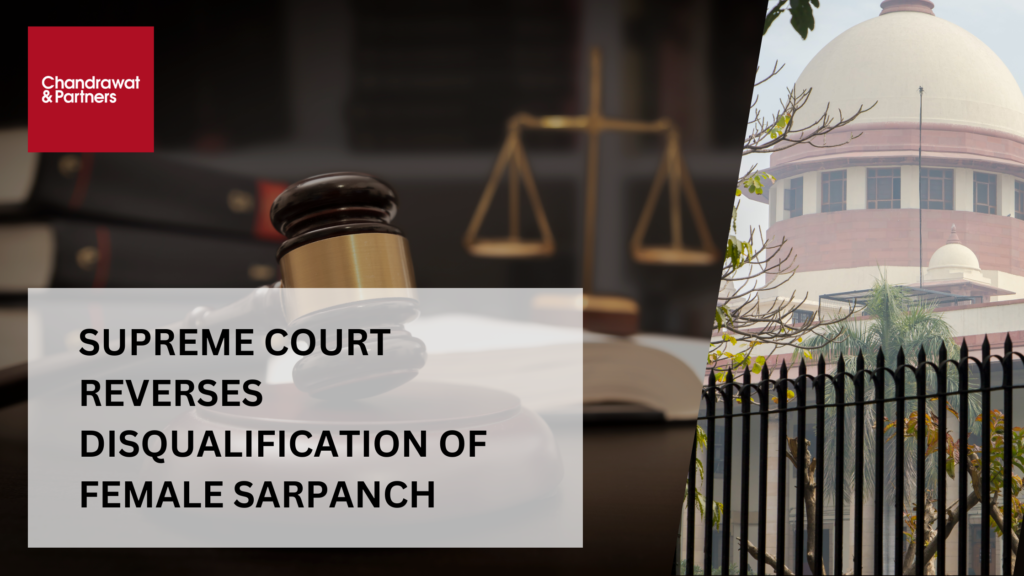Home > Recent Judgements > Supreme Court Reverses Disqualification Of Female Sarpanch
Oct 07, 2024

SUPREME COURT REVERSES DISQUALIFICATION OF FEMALE SARPANCH
In a Landmark ruling of MANISHA RAVINDRA PANPATIL VERSUS THE STATE OF MAHARASHTRA & ORS. , the Supreme Court of India recently took a firm stand against systemic gender discrimination within public offices, offering crucial relief to a female Sarpanch from Vichkheda, a village in Maharashtra’s Jalgaon District. The Appellant, who had been disqualified on technical grounds, was reinstated by the Court. This decision underscored the ongoing challenges women face, particularly in rural governance, and highlighted the discriminatory attitudes that pervade administrative structures.
THE ORCHESTRATED DISQUALIFICATION
The case centred around the Appellant, a woman elected as Sarpanch under the reservation quota for women. However, despite being elected through this mechanism, the Sarpanch faced significant opposition from the village residents.
Seemingly uncomfortable with a woman in power, the villagers appeared to resist her authority. This resistance could be attributed to deep-rooted patriarchal attitudes and biases that often hinder women’s participation in leadership roles. Such biases can manifest in various forms, including active opposition, undermining efforts, and spreading rumours.
Without conducting a thorough investigation, the Collector disqualified the Sarpanch. This decision was a clear indication of bias and a disregard for due process. The Collector’s failure to properly examine the evidence and investigate the allegations demonstrated a lack of commitment to fairness and justice.
This decision was upheld by both the Divisional Commissioner and the High Court. This series of adverse decisions highlighted the systemic challenges faced by women in rural governance. The authorities involved seemed to be influenced by societal biases and prejudices, rather than focusing on the merits of the case.
However, the Supreme Court found the entire process to be both biased and rushed, and thus intervened. The Supreme Court’s intervention was crucial in upholding the Sarpanch’s rights and challenging the discriminatory practices that had led to her disqualification. The Court’s decision marked a significant victory for gender equality and women’s empowerment in India.
COURT IDENTIFIES SYSTEMIC DISCRIMINATION
The Supreme Court’s concerns in this case reflect deep-seated issues related to gender discrimination in India’s rural political landscape. The bench, comprising Justices, did not merely focus on the technicalities of the disqualification but highlighted a much larger, systemic issue — the entrenched bias that women leaders, particularly in rural areas, continue to face.
The Court pointed out that this case was not an isolated incident. It is part of a broader, disturbing trend where women, especially those elected through affirmative action measures, face orchestrated efforts to undermine their authority. The Court identified a “systemic pattern” of prejudicial treatment, where women leaders are not only questioned but are also often removed from office based on flimsy or fabricated grounds. This discrimination, the Court suggested, is not limited to the grassroots level but is reinforced by administrative practices that fail to protect the rights of these elected women.
The remark about “prejudicial treatment permeating through all levels of administrative functioning” speaks to a larger issue of institutional bias. Administrative bodies, including the Collector in this case, acted hastily without verifying facts, reflecting an indifference or perhaps complicity in perpetuating gender bias. The Court’s statement signals the urgent need for a shift in administrative attitudes toward women leaders, calling for a more equitable and respectful treatment of women in positions of power, especially in rural governance, where they are most vulnerable to discrimination.
COURT CONDEMNS EXCESSIVE PUNISHMENT
A division bench granted bail on the grounds of prolonged incarceration and the absence of a scheduled offence at the time of filing of the ED complaint under the Prevention of Money Laundering Act, 2002 (PMLA).
The Court also noted that about the circumstance that the facts of both cases are identical as the come from the same Enforcement Case Information Report and the same complaint under Section 44 of PMLA. Appellant has been in custody for nearly two years respect to sustained learning outcomes while as Appellant no 2 had been in prison for one year and nine months the Court noted.
The Court highlighted that out of these, only Section 120-B was classified as an offense under PMLA. Still, it was that the Supreme Court ruling in Pavana Dibbur v. Directorate of Enforcement had enabled the prosecution to move away from Section 120-B as a scheduled offence because no conspiracy to commit a scheduled offence was charged and therefore none was proved to the detriment of the accused.
The Court further observed that Section 384 (extortion) was incorporated in the First Information Report “FIR’ at a later stage and that an ECIR was drawn up in respect of that FIR.
However, since both Appellant were respectively now released on bail by the Supreme Court, it was insisted that they be forthwith produced before the Special Court because it may enlarge them on bail with appropriate terms and conditions after hearing the ED’s counsel. The Court further explained that these remarks of theirs were not to be construed as the findings of this Court on the aspects of the complaint but were restricted only for consideration of the issue of bail.
CONCLUSION
The Supreme Court’s ruling not only reinstated the disqualified Sarpanch but also set a critical precedent for how women representatives should be treated, particularly in rural areas. The Court urged authorities to adopt a more sensitive, measured approach when dealing with female leaders and emphasized the importance of promoting gender equity at all levels of governance.
This judgment stands as a powerful reminder of the need to protect the rights of women in elected offices, ensuring that their contributions to India’s political landscape are respected and safeguarded. By overturning this unjust disqualification, the Court reaffirmed its commitment to advancing gender equality and empowering women leaders across the country.
For more information or queries, please email us at
enquiries@chandrawatpartners.com




